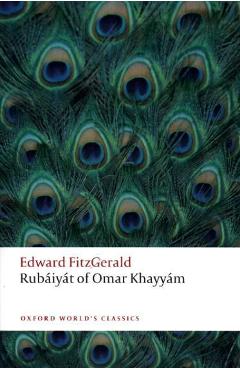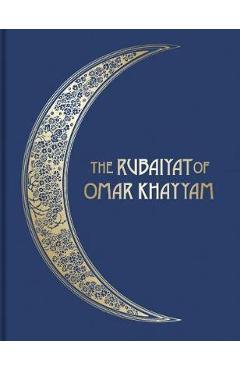The Rubáyát of Omar Khayyám: (or, Rubaiyat of Omar Khayyam) - Edward Fitzgerald

Detalii The Rubáyát of Omar Khayyám:
libris.ro
41.78 Lei
46.42 Lei
Poetry
Edward Fitzgerald
The Rubáyát of Omar Khayyám: - Disponibil la libris.ro
Pe YEO găsești The Rubáyát of Omar Khayyám: de la Edward Fitzgerald, în categoria Poetry.
Indiferent de nevoile tale, The Rubáyát of Omar Khayyám: (or, Rubaiyat of Omar Khayyam) - Edward Fitzgerald din categoria Poetry îți poate aduce un echilibru perfect între calitate și preț, cu avantaje practice și moderne.
Preț: 41.78 Lei
Caracteristicile produsului The Rubáyát of Omar Khayyám:
- Brand: Edward Fitzgerald
- Categoria: Poetry
- Magazin: libris.ro
- Ultima actualizare: 28-10-2025 01:22:05
Comandă The Rubáyát of Omar Khayyám: Online, Simplu și Rapid
Prin intermediul platformei YEO, poți comanda The Rubáyát of Omar Khayyám: de la libris.ro rapid și în siguranță. Bucură-te de o experiență de cumpărături online optimizată și descoperă cele mai bune oferte actualizate constant.
Descriere magazin:
The Rubáiyát of Omar Khayyám is the title that Edward FitzGerald gave to his translation of a selection of poems, originally written in Persian and numbering about a thousand, attributed to Omar Khayyám (1048-1131), a Persian poet, mathematician and astronomer. A ruba\'i is a two-line stanza with two parts (or hemistichs) per line, hence the word rubáiyát (derived from the Arabic language root for four), meaning quatrains. Mystical interpretation Wine of the Mystic by Paramahansa Yogananda, is an illustrated interpretation of the FitzGerald translation. Each quatrain is accompanied with Persian text, a glossary of terms, Yoganada\'s spiritual interpretation, and practical interpretation. It won the 1994 Benjamin Franklin Award in the field of Religion. Yogananda makes an argument for the mystical basis of Khayyam\'s Rubaiyat. In Who is the Potter?, Abdullah Dougan, a Naqshbandi Sufi, provides a verse-by-verse commentary of the Rubaiyat. Dougan says that while Omar is a minor Sufi teacher compared to the giants - Rumi, Attar and Sana\'i, for us he is a marvelous man because we can feel for him and understand his approach. The work is much more accessible than Sana\'i\'s for instance; Every line of the Rubaiyat has more meaning than almost anything you could read in Sufi literature. Dougan says that the many critics of Fitzgerald miss the point as he is only an instrument for what Allah wanted to happen - there have been many more literally correct translations, but Fitzgerald\'s is divine inspiration, something far superior, a miracle. In Dougan\'s opinion, while many read the Rubaiyat literally and hence see Omar as a materialist, he is in fact a spiritual teacher and is much maligned because people do not understand him. Abdullah Dougan says the work is deeply esoteric and if you approach the quatrains with that in mind, the poem will have a tremendous impact on you as you try to understand it. Religious beliefs were deeply instilled in the people of the time, which gave much influence to the clergy, and the prosecution of poets who made statements contradictory to religious messages were prevalent, as was the case with Hafiz (whose house was raided several times, and was forced to burn some of his more liberal poems) and Ferdowsi (who was branded a heretic and was not permitted to be buried in the Muslims graveyard). The mystic interpretation of themes in poetry which were contrary to Islamic teachings became popular after the Safavid dynasty rise to p

Produse asemănătoare
Produse marca Edward Fitzgerald

The Rubáyát of Omar Khayyám: (or, Rubaiyat of Omar Khayyam) - Edward Fitzgerald
![]() libris.ro
libris.ro
Actualizat in 28/10/2025
41.78 Lei

The Rub�iy�t of Omar Khayy�m: First and Fifth Editions - Edward Fitzgerald
![]() libris.ro
libris.ro
Actualizat in 28/10/2025
24.42 Lei


